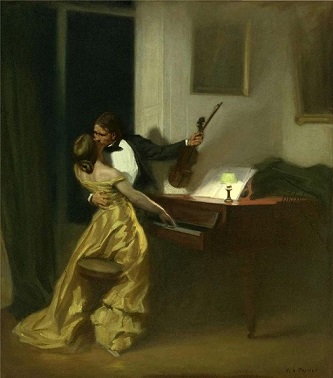
Kreutzer Sonata courtesy of commons.wikimedia.org
Peter Susskind’s masterful novel Perfume is the story of a man, beastly in form, who concocts fragrances so intoxicating, they summon illusions. Ignore the fact that he murders beautiful young women to obtain his secret ingredients.
Fantastic as it seems, the book’s association of scent with power lies closer to the truth than many of us realize. Consider, for example, the proximity of the limbic system to the nose. The former gives us our visceral responses to the world. The latter is a receptor that facilitates that connection, most importantly to food.
Scent is also a link to our emotions and memories. Aromas that repel or attract can be attributed to recollection—a blast from the past if you will. That symbiosis may explain why aromatherapy has a positive effect on Alzheimer’s patients.
Happily, some scents that please humans repel insects, most commonly, mosquitoes. Other aromatic benefits exist, too. A 2018 study on rabbits found that lemon scent lowered their cholesterol. Two years late, another report proved the same benefit existed for humans.
Aromatherapy is an ancient tradition which western medicine has been slow to accept. Even so, most of us recognize that scent is a mood booster. I know a woman who wraps herself in a perfume cloud thick enough to be visible. There’s a reason. Her husband adored the label. When she wears it, she feels closer to him.
Her reliance on scent to evoke feelings isn’t unique. Napoleon hauled casks of his favorite cologne with him as he pillaged Europe. He imagined the aroma fortified both him and his troops. Marie Antoinette must have felt the same way. Before laying her neck bare upon the guillotine, she doused herself in her favorite fragrance. (“Scents of Survival,” by Beatriz Zimmermann, Town&Country, May 2021, pg. 53.)
To feel alluring, my mother splashed Tabu behind her ears. Similarly, I have a friend who gives her husband a come hither signal with Dior’s Poison. If there’s symbolism in that, I wouldn’t care to say.
These days, I don’t wear much perfume. I live in a community where people have allergies. In my youth, I loved White Shoulders and Cabochard. Today, before Covid-19, if I were meeting friends for dinner, I’d spray a little Georgie on my wrist. Unlike my mother’s heavy, exotic fragrance, I liked Georgie’s woodsy notes.
Given the therapeutic and pleasurable benefits of fragrance, I wondered if it also conveyed a message. For an answer, I turned to Coco Chanel, creator of the timeless Chanel 5. A young woman once asked the couturier where best to apply perfume. Her answer was unequivocal. “Where you want to be kissed.”
